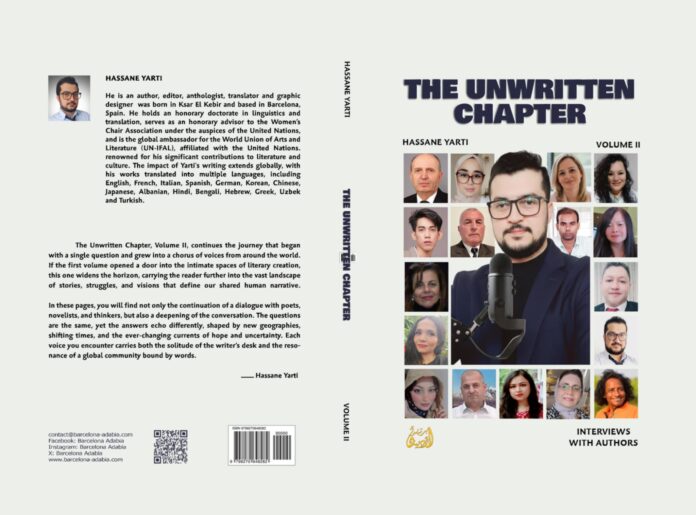By Hassane Yarti
With The Unwritten Chapter, Volume II, Moroccan author Hassane Yarti continues his ambitious literary endeavour to bring together the voices of writers from across continents into one resonant dialogue. Following the success of the first volume, which opened a rare window into the personal and creative worlds of contemporary authors, this new edition expands the horizon, delving even deeper into the universal questions that define literature and the human spirit. This second volume, published by Barcelona Literary Publishing, carries the full title: The Unwritten Chapter (Interviews with Authors), Volume II, First Edition, 2025. It gathers seventeen remarkable voices from around the world: Angela Kosta, Antonietta Micali, Niamat Elhamri, Dr. Mujë Buçpapaj, Võ Thị Như Mai, Md Ejaj Ahamed, Kujtim Hajdari, Antonio Bernard Ma-at, Adnan Mouchahi, Cettina La Placa, Houssine Yarti, Mariela Cordero, Niloy Rafiq, Zahra Ahmed Boulahia, Prachi Gupta, Lulzim Hajdari, and Nina Alsirtawi, each contributing a distinct rhythm to the symphony of contemporary literature. Their words cross borders of geography, culture, and language, uniting in one shared pursuit: the truth of artistic expression. In his introduction, Yarti reflects: “If the first volume opened a door into the intimate spaces of literary creation, this one widens the horizon… The questions are the same, yet the answers echo differently, shaped by new geographies, shifting times, and the ever-changing currents of hope and uncertainty.” Through these intimate and thought-provoking dialogues, The Unwritten Chapter, Volume II becomes more than a collection of interviews, it transforms into a chorus of literary consciousness, revealing the solitude and universality of the writer’s journey. Each conversation captures not only the writer’s craft but also the fragile balance between memory and imagination, tradition and transformation. As a continuation of the global project launched by Yarti in the first volume, this edition reinforces his conviction that literature remains both witness and resistance; a force that heals, remembers, and redefines. It is a celebration of the written word as a bridge between voices, as an act of endurance, and as a quiet defiance against oblivion. Yarti concludes: “Literature matters, as witness, as resistance, as healing, and as an act of faith in tomorrow.” The book’s structure—interviews spanning continents and languages—offers a comparative study in itself. The diversity of its participants reflects a new literary cartography: from Europe to Asia, from Africa to the Americas, voices intersect around common themes of exile, belonging, identity, and resilience. Each author speaks from a different geography, yet their experiences echo the same existential quest—to find meaning through words. Critically, Yarti’s editorial vision positions him not only as an interviewer but as a curator of thought. His questions act as bridges between cultures, while his restraint allows each writer’s individuality to shine. The dialogue becomes an art form—an exploration of what it means to write, to remember, and to remain human in times of uncertainty. From a stylistic standpoint, The Unwritten Chapter, Volume II balances intellectual depth with emotional intimacy. The prose is lyrical yet disciplined, creating a space where philosophy meets storytelling. Readers are invited not merely to read about writers, but to inhabit their silences and struggles, to witness the invisible process through which art transforms experience into language. Ultimately, this book is both testimony and testament—a record of literary thought in the early 21st century and a reminder that creativity continues to be a universal act of courage. In uniting so many distinct voices, Yarti affirms that the “unwritten chapter” of literature is precisely what keeps humanity writing forward.


